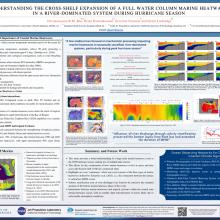Understanding the cross-shelf expansion of a full water column marine heatwave in a river-dominated system during hurricane season.
Devanarayana R.M.
Rao
Stokes School of Marine and Environmental Sciences, University of South Alabama, Mobile, AL, United States 36688 ; Dauphin Island Sea Lab, Dauphin Island, AL, United States 36528
Poster
Marine heatwaves (MHWs) are characterized by extreme thermal conditions in the ocean that last for an extended period of time. Such events during peak hurricane season can impact storm intensification, posing a significant threat to coasts and large marine ecosystems. In coastal regions, often, the full depth evolution of MHWs is required to anticipate potential impacts on storm intensity. However, such an understanding of coastal MHW is limited, particularly in river-dominated systems where salinity stratification can be important in the evolution of such events. The study focuses on the Mississippi Bight, which is regularly affected by tropical cyclones and Mississippi River discharge. In this study, a 16-year time series of full water column hydrographic data, in conjunction with remote sensing and reanalysis datasets, were used to understand the initiation, expansion, and decay of a significantly large coastal MHW in the Gulf of Mexico during the 2019 hurricane season. Event sequences proved to be critical to the evolution of the MHW, which featured the complex interaction between atmospheric heatwaves, tropical storms, freshwater influx, and other coastal processes. In a warming climate, the mechanistic understanding of the marine heatwave evolution will be expected to be increasingly crucial for improved storm forecasting accuracy prior to landfall and the assessment and conservation of vulnerable ecosystems.

Poster file
MohanRao-DevanarayanaRao-poster.pdf
(1.58 MB)
